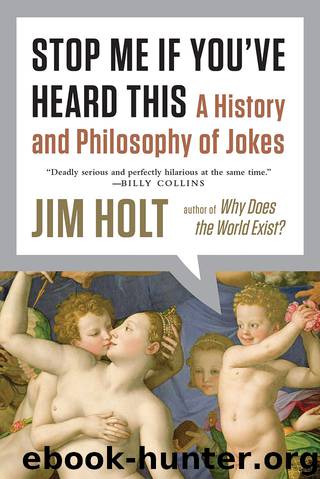Stop Me If You've Heard This by Jim Holt & Jim Holt

Author:Jim Holt & Jim Holt
Language: eng
Format: epub
Publisher: W.W. Norton & Company
Published: 2007-12-31T16:00:00+00:00
Sigmund Freud (1856–1939). The psychoanalyst of humor, whose own favorite jokes betrayed a deep ambivalence about his Jewish identity.
Freud was an avid collector of jokes, particularly Jewish jokes, and his book contains 138 specimens, by my count. Some are excellent (“A royal personage was making a tour through his provinces and noticed a man in the crowd who bore a striking resemblance to his own exalted person. He beckoned to him and asked: ‘Was your mother at one time in service in the Palace?’—‘No, your Highness,’ was the reply, ‘but my father was.’”). Some are middling (“A Jew noticed the remains of some food in another one’s beard. ‘I can tell you what you had to eat yesterday.’—‘Well, tell me.’—‘Lentils, then—.’ ‘Wrong: that was the day before yesterday.’”). Some are dated—to put it charitably—or perish in translation (“Mr. and Mrs. X live in fairly grand style. Some people think that the husband has earned a lot and so has been able to lay by a bit [sich etwas zurückgelegt]; others again think that the wife has lain back a bit [sich etwas zurückgelegt] and so has been able to earn a lot.” Freud reckons this “a really diabolically ingenious joke!”). And when it comes to phrasing, Freud is no Henny Youngman; one of his efforts begins, “An impoverished individual borrowed 25 florins from a prosperous acquaintance, with many asseverations of his necessitous circumstances…”
In making his idiosyncratic collection of jokes, Freud left himself open to analysis. In 1997 the folklorist Elliott Oring put him on the couch in the book The Jokes of Sigmund Freud, concluding that Freud’s jokes betrayed a deep ambivalence about his Jewish identity, an ambivalence that could be traced to a childhood episode in which his nurse caught him spitting on the steps. The very impulse to amass jokes, which are usually considered to be relatively worthless and disposable items, can be given a psychosexual explanation. In a 1917 paper on “anal eroticism,” Freud offered the following analysis. The infant is confused by his bodily products. His excrement seems to be of some value, since it issues from his body and attracts the interest of his parents (it’s the infant’s “first gift,” Freud says); but this excrement is taken away and disposed of, so it also seems valueless. Gradually the child is weaned away from his normal curiosity in the waste products of his body, via the reality principle, by a series of drier and drier substitutes—mud-pies, sand piles, and so on. Yet, among neurotics, the urge to hoard that which is disposable and of little intrinsic value—old newspapers, coasters, empty beer cans, money—remains. (The identification of gold with feces, according to Freud, is behind such locutions as “filthy rich” and a “shitload of money.”) And nothing is more disposable than a joke.
Download
This site does not store any files on its server. We only index and link to content provided by other sites. Please contact the content providers to delete copyright contents if any and email us, we'll remove relevant links or contents immediately.
Spell It Out by David Crystal(36110)
Professional Troublemaker by Luvvie Ajayi Jones(29651)
The Secret History by Donna Tartt(19058)
We're Going to Need More Wine by Gabrielle Union(19036)
Cat's cradle by Kurt Vonnegut(15339)
The Goal (Off-Campus #4) by Elle Kennedy(13658)
The Social Justice Warrior Handbook by Lisa De Pasquale(12187)
The Break by Marian Keyes(9358)
Crazy Rich Asians by Kevin Kwan(9280)
The remains of the day by Kazuo Ishiguro(8981)
Thirteen Reasons Why by Jay Asher(8894)
Educated by Tara Westover(8047)
The handmaid's tale by Margaret Atwood(7757)
Giovanni's Room by James Baldwin(7330)
Win Bigly by Scott Adams(7184)
This Is How You Lose Her by Junot Diaz(6877)
The Rosie Project by Graeme Simsion(6381)
Six Wakes by Mur Lafferty(6243)
The Power of Now: A Guide to Spiritual Enlightenment by Eckhart Tolle(5761)
